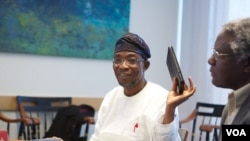The governor of Nigeria’s Osun state says his administration has been implementing measures to improve the quality of high school education in the state.
As part of the effort, Governor Rauf Aregbesola says the state is in the process of providing all public high school students with free handheld digital tablets computers to help with their school work and also is rebuilding public sector elementary and secondary schools.
“We are committed to human capacity development in all its ramifications, and if that is genuine then education must play a principal role,” said Aregbesola.
“We just introduced a tool for learning called ‘tablet of knowledge.’ It is an electronic platform with three segments; the first segment is the E-library covering all the subjects being taught in the state. The second is the test segment, where you have 40,000 questions, and the third segment is where students have audio interaction with their teachers,” he said.
Aregbesola said he hoped the tablet computers would help bridge the growing divide between students in developing countries and the advanced countries.
“We are with this divide. Removing the digital divide existing between the children of the third world, where access to digital technology is almost impossible, this perhaps has the solution to that divide,” he said.
Aregbesola said the state has increased education funds for running primary elementary schools from N7-million ($44,053) per annum to N 427 million ($2,686,211), and also increased funding for secondary schools from N170-million ($1,069,840) to N424-million per year ($2,668,338).
He said the state government has signed a partnership agreement with private local fabric manufacturers to provide free school uniforms and help to improve a school lunch program.
Some critics, however, have accused some state governments of using the idea of improving education to help hide financial corruption. Additionally, some critics have accused Aregbesola is using Osun state programs as a platform to launch a future presidential bid in Nigeria, an allegation he denies.
“We are doing this in collaboration with beneficiaries and financial institutions. For example the government is not involved at all in the school feeding system; the banks supply the meals to the pupils,” Aregbesola said. “The government’s role is to ensure the quality of the meal and the level of hygiene of the vendors,” he said. “So the issue of parochial or corrupt interest is removed, and this we do consciously for transparency.”
As part of the effort, Governor Rauf Aregbesola says the state is in the process of providing all public high school students with free handheld digital tablets computers to help with their school work and also is rebuilding public sector elementary and secondary schools.
“We are committed to human capacity development in all its ramifications, and if that is genuine then education must play a principal role,” said Aregbesola.
“We just introduced a tool for learning called ‘tablet of knowledge.’ It is an electronic platform with three segments; the first segment is the E-library covering all the subjects being taught in the state. The second is the test segment, where you have 40,000 questions, and the third segment is where students have audio interaction with their teachers,” he said.
Aregbesola said he hoped the tablet computers would help bridge the growing divide between students in developing countries and the advanced countries.
“We are with this divide. Removing the digital divide existing between the children of the third world, where access to digital technology is almost impossible, this perhaps has the solution to that divide,” he said.
Aregbesola said the state has increased education funds for running primary elementary schools from N7-million ($44,053) per annum to N 427 million ($2,686,211), and also increased funding for secondary schools from N170-million ($1,069,840) to N424-million per year ($2,668,338).
He said the state government has signed a partnership agreement with private local fabric manufacturers to provide free school uniforms and help to improve a school lunch program.
Some critics, however, have accused some state governments of using the idea of improving education to help hide financial corruption. Additionally, some critics have accused Aregbesola is using Osun state programs as a platform to launch a future presidential bid in Nigeria, an allegation he denies.
“We are doing this in collaboration with beneficiaries and financial institutions. For example the government is not involved at all in the school feeding system; the banks supply the meals to the pupils,” Aregbesola said. “The government’s role is to ensure the quality of the meal and the level of hygiene of the vendors,” he said. “So the issue of parochial or corrupt interest is removed, and this we do consciously for transparency.”





